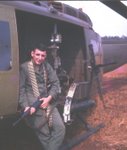When ones DEROS, (Date Eligible for Return From Overseas) was attained, your tour was complete. A week or so before you went home you packed all the stuff you had accumulated and sent it back home. Most of us had acquired open reel tape decks, speakers, turntables and tuner amplifiers, which were dirt cheap in Nam. Everything was inspected to insure mainly that you wern't sending back slides or photos that proved positively that we were killing people and being killed in the process. I think they also looked for arms, ammunition, explosives and drugs but I’m not really sure. The last night in country invariably turned into a huge party that was an impromptu “roast” of the departing aviator. Needless to say, liquor flowed freely enough to provide him with a hangover that would last until he got home. I was lucky enough to hitch a ride to Ton Son Nuit Air Force base on one of our Hueys which made the trip to deliver me to the “Freedom Bird” but mainly to allow the pilots and crew to go to the big PX there.
You got checked in for your flight, selected the appropriate uniform for the season back home and then spent that last night whooping it up at the Air Force Officers Club. It seemed like the Air Force pilots took a special liking to us Army pilots for some reason and any Air Force officers club we visited treated us very well. (The F-4 Phantom pilots all thought we were borderline lunatics for flying some of the missions we did.)
The next day was emotion charged as you checked in again and finally boarded the big Boeing 707 for the trip home. During the takeoff roll the cheering started and when we felt the wheels “thunk” into the wells there was back slapping, more cheering and crying all around. Many guys brought liquor with them even though it was forbidden to do so and quickly another party was going full blast. We slept through most of the flight and soon we were on final approach and the cheering started again. It crested when we felt the wheels touch the ground and knew we were finally home alive. Many of us knelt down and kissed the ground when we exited the aircraft we were so happy. We entered the terminal at Seattle, Washington, claimed our duffle bags and tried to make our way to telephones or to arrange further flights to get home.
There were large groups of protesters in full hippie regalia that chanted slogans and even attempted to spit on us as walked through the terminal. We were warned prior to landing not to get into any altercations with the protestors. We were called baby murderers, killers, assassins and all sorts of other things and it was frustrating and confusing to be welcomed home this way. Most of us couldn’t change out of uniform and into civilian clothing fast enough. It was comforting to get on another flight for the final trip home to our wives and families. I’ve read that reports of the protestors demonstrating and spitting on the returning servicemen was a myth or legend but it was the real thing. None of us liked the Vietnam war either but few of us had any choice about being there.
Subscribe to:
Post Comments (Atom)



1 comment:
Been there done that too. I’ve also read that "reports of the protesters demonstrating and spitting on the returning servicemen was a myth or legend" and I can attest to the fact that it was the real thing. Me too.
Post a Comment